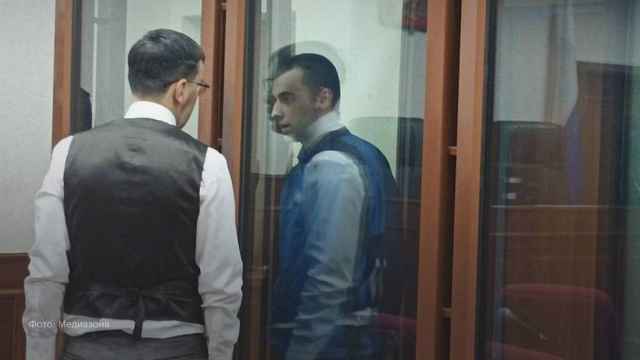The Moscow brokerage Troika Dialog that was bought by state-owned financial giant Sberbank last year continued its recent hiring spree Wednesday with the appointment of former Renaissance Capital equity strategist Ovanes Oganisian.
The announcement is the latest in a string of high-profile positions to be filled at the banking firm. Oganisian will assist veteran Russia commentator and Troika chief strategist Chris Weafer, poached from ING Bank in August.
The staffing changes come in the wake of Sberbank's March 2011 takeover that is due to be finalized early this year. The bank's head, German Gref, said at the time of the deal that Troika would help Russia's biggest lender to develop a full range of financial services.
Its rapid acquisition of industry talent sets Troika apart from most domestic and international investment banks but invites comparisons with VTB Capital. The investment-banking arm of government-owned VTB is aggressively pursuing an expansion program.
Numerous hirings and heavy investment catapulted VTB Capital into a prominent position in Russian banking during the 2009 economic crisis. It was ranked No. 1 in Russian mergers and acquisitions volume as well as debt capital market transactions in 2011.
An acquaintance of Maxim Safonov, named head of fixed income, currencies and commodities at Troika, on Tuesday told The Moscow Times on condition of anonymity that Safonov was likely to have been tempted by Sberbank's broader horizons. "I don't know whether Troika had enough of a book to work with a guy like Maxim," he said. "But Sberbank does."
Strategist Oganisian said in a statement that he was glad to be able to continue his career "under the auspices of the region's largest universal banking player."
Other senior recruitments to Troika include Standard's Rob Leith as global head of investment banking in November and equity trader Yury Aldakimov from Otkritie Financial in December.
The co-head of investment banking Todd Berman, hired from Merrill Lynch in September, said last month that Troika was planning to boost its 100-strong investment banking team by up to 40 percent within 14 months.
In a similar vein, VTB Capital revealed in October that it was seeking to hire 100 international staff in 2012 and open offices in Bulgaria and Turkey. In 2011 it expanded its workforce by more than 30 percent.
The profligacy of Sberbank and VTB contrasts with most investment banks. Over 70,000 redundancies in the global banking industry were announced last year with 3,500 from UBS, 2,000 from Credit Suisse and 1,000 from Goldman Sachs.
Though it made a few investment-banking appointments in 2011, Renaissance Group, the emerging market-focused bank 50 percent owned by presidential candidate Mikhail Prokhorov, cut 10 percent of its payroll in September.
Foreign banks do not consider it prudent to be hiring at the moment, said Jason Hurwitz, a financial analyst at Alfa Bank. "It would seem strange to be cost-cutting and hiring big guns at the same time."
Russian state-owned banks have long been accused of exploiting their privileged access to capital during periods of economic crisis and squeezing private operations. Foreign banks including HSBC, Barclays and Santander have cut back their Russian outfits in recent years.
"It's not shocking to see Sberbank stepping in and saying they want to be one of the big players in the investment-banking market," Hurwitz said.
But the moves have not all been one way. The Sberbank tie-up — that was opposed by some top executives — also prompted departures from Troika.
"These changes are an ongoing consequence of the merger with Sberbank rather than any new move by Troika," said Richard Hainsworth, director of independent ratings agency RusRating. "It's new for old."
Jacques Der Megreditchian, who argued against the Sberbank deal, resigned as Troika's deputy chief executive and head of global markets in September.
One banker who left Troika because of the Sberbank takeover told The Moscow Times on condition of anonymity that somewhere between a quarter and a third of his team had moved with him. But he added that there may be more high-profile resignations to come.
"Most partners get paid out at the end of January," he said. "The proof will be in the pudding then."
A Message from The Moscow Times:
Dear readers,
We are facing unprecedented challenges. Russia's Prosecutor General's Office has designated The Moscow Times as an "undesirable" organization, criminalizing our work and putting our staff at risk of prosecution. This follows our earlier unjust labeling as a "foreign agent."
These actions are direct attempts to silence independent journalism in Russia. The authorities claim our work "discredits the decisions of the Russian leadership." We see things differently: we strive to provide accurate, unbiased reporting on Russia.
We, the journalists of The Moscow Times, refuse to be silenced. But to continue our work, we need your help.
Your support, no matter how small, makes a world of difference. If you can, please support us monthly starting from just $2. It's quick to set up, and every contribution makes a significant impact.
By supporting The Moscow Times, you're defending open, independent journalism in the face of repression. Thank you for standing with us.
Remind me later.






